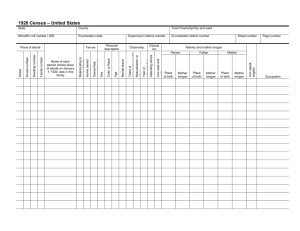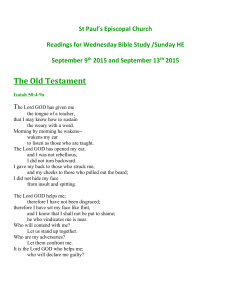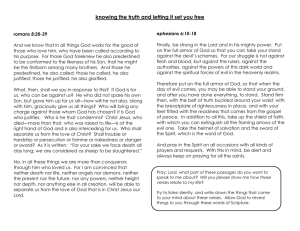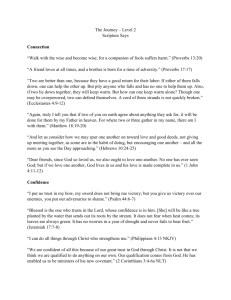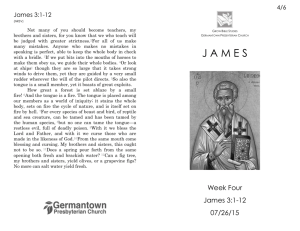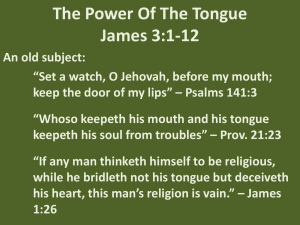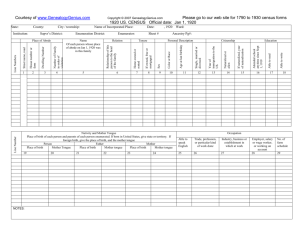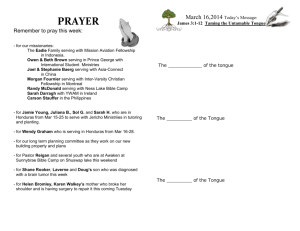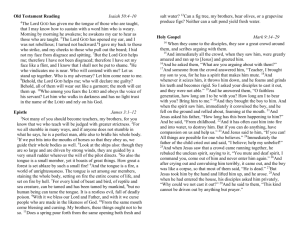The Effect of the Softly Spoken Word
advertisement
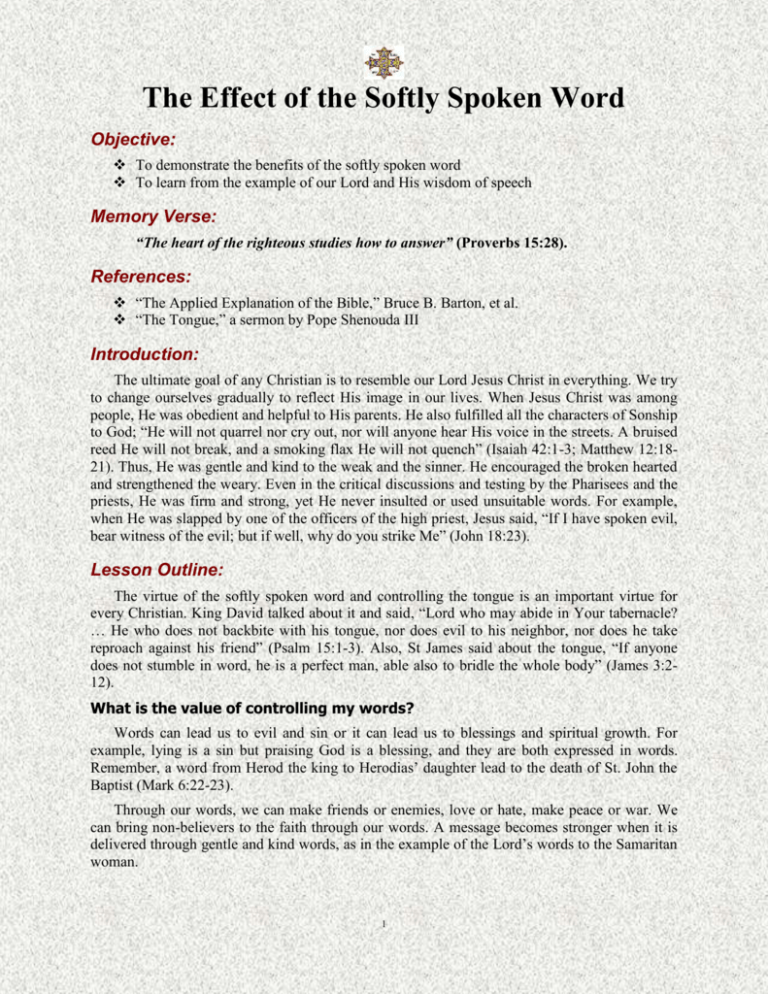
The Effect of the Softly Spoken Word Objective: To demonstrate the benefits of the softly spoken word To learn from the example of our Lord and His wisdom of speech Memory Verse: “The heart of the righteous studies how to answer” (Proverbs 15:28). References: “The Applied Explanation of the Bible,” Bruce B. Barton, et al. “The Tongue,” a sermon by Pope Shenouda III Introduction: The ultimate goal of any Christian is to resemble our Lord Jesus Christ in everything. We try to change ourselves gradually to reflect His image in our lives. When Jesus Christ was among people, He was obedient and helpful to His parents. He also fulfilled all the characters of Sonship to God; “He will not quarrel nor cry out, nor will anyone hear His voice in the streets. A bruised reed He will not break, and a smoking flax He will not quench” (Isaiah 42:1-3; Matthew 12:1821). Thus, He was gentle and kind to the weak and the sinner. He encouraged the broken hearted and strengthened the weary. Even in the critical discussions and testing by the Pharisees and the priests, He was firm and strong, yet He never insulted or used unsuitable words. For example, when He was slapped by one of the officers of the high priest, Jesus said, “If I have spoken evil, bear witness of the evil; but if well, why do you strike Me” (John 18:23). Lesson Outline: The virtue of the softly spoken word and controlling the tongue is an important virtue for every Christian. King David talked about it and said, “Lord who may abide in Your tabernacle? … He who does not backbite with his tongue, nor does evil to his neighbor, nor does he take reproach against his friend” (Psalm 15:1-3). Also, St James said about the tongue, “If anyone does not stumble in word, he is a perfect man, able also to bridle the whole body” (James 3:212). What is the value of controlling my words? Words can lead us to evil and sin or it can lead us to blessings and spiritual growth. For example, lying is a sin but praising God is a blessing, and they are both expressed in words. Remember, a word from Herod the king to Herodias’ daughter lead to the death of St. John the Baptist (Mark 6:22-23). Through our words, we can make friends or enemies, love or hate, make peace or war. We can bring non-believers to the faith through our words. A message becomes stronger when it is delivered through gentle and kind words, as in the example of the Lord’s words to the Samaritan woman. 1 How can I acquire the virtue of the softly spoken words? Pray that God may help you be as gentle as He was. Ask the Holy Spirit to work and speak on your tongue. Think Before You Speak The wise and righteous thinks before he talks because he would like to present his thoughts and ideas in the best manner. On the other hand, the foolish and impulsive person talks without thinking because he does not care about the consequences of what he says. In Proverbs, King Solomon said, “The tongue of the wise uses knowledge rightly, but the mouth of fools pours forth foolishness” (Proverbs15:2). Choose the Words Carefully You may have great ideas, but if you use bad words to present them, they would seem to be bad ideas. Therefore, ask yourself, “Am I choosing the correct words or am I just talking?” The words of a Christian guide others to Christianity. People know that we are Christian by our words. St. John Chrysostom was described as having a mouth of gold because of the words of blessing he delivered during his sermons. A true Christian is able to make a conversation constructive and comforting (Proverb 9:11). Put Yourself in Place of the Listener You can build bridges or destroy them through your words with others. If you place yourself in the listener’s place, you may be able to judge if your words bring comfort and knowledge to others or if they bring hurt and anger; “Soft answer turns away wrath, but a harsh word stirs up anger” (Proverb 15:1). Also, the Lord commanded us to do unto others what we would like done to us (Matthew 7:12). Remember That Your Words Indicate What is in Your Heart The words that come from your mouth indicate what is in your heart, “For out of the abundance of the heart the mouth speaks” (Matthew 12:33-37). So, let the Holy Spirit work in your heart to purify it and thus purify your words. By no means can you speak good words if the heart is not clean (Luke 6:45). Conclusion: Experience the blessings of the softly spoken words in your life. Take the example of Job who blessed the Lord, even in his hardship, and Solomon the king whose words of wisdom brought the queen of Sheba from thousands of miles afar to listen to him (1 Kings 10:1-7). Applications: Avoid bad words, swearing, dirty jokes and lying. Avoid unproductive conversations and gossiping. 2 Bible Verses on the Tongue 1. Death and life [are] in the power of the tongue. And those who love it will eat its fruit. (Proverbs 18:21) 2. For by your words you will be justified, and by your words you will be condemned. (Matthew 12:37) 3. With it we bless our God and Father, and with it we curse men, who have been made in the similitude of God. Out of the same mouth proceed blessing and cursing. My brethren, these things ought not to be so. (James 3:9-10) 4. Then one of the criminals who were hanged blasphemed Him, saying, "If You are the Christ, save Yourself and us." But the other, answering, rebuked him, saying, “Do you not even fear God, seeing you are under the same condemnation? And we indeed justly, for we receive the due reward of our deeds; but this Man has done nothing wrong." Then he said to Jesus, "Lord, remember me when You come into Your kingdom." And Jesus said to him, "Assuredly, I say to you, today you will be with Me in Paradise." (Luke 23:39-43) 5. If anyone among you thinks he is religious, and does not bridle his tongue but deceives his own heart, this one's religion [is] useless. (James 1:26) 6. For we all stumble in many things. If anyone does not stumble in word, he [is] a perfect man, able also to bridle the whole body. Indeed, we put bits in horses' mouths that they may obey us, and we turn their whole body. Look also at ships: although they are so large and are driven by fierce winds, they are turned by a very small rudder wherever the pilot desires. Even so the tongue is a little member and boasts great things. See how great a forest a little fire kindles! And the tongue [is] a fire, a world of iniquity. The tongue is so set among our members that it defiles the whole body, and sets on fire the course of nature; and it is set on fire by hell. For every kind of beast and bird, of reptile and creature of the sea, is tamed and has been tamed by mankind. But no man can tame the tongue. [It] [is] an unruly evil, full of deadly poison. With it we bless our God and Father, and with it we curse men, who have been made in the similitude of God. Out of the same mouth proceed blessing and cursing. My brethren, these things ought not to be so. Does a spring send forth fresh [water] and bitter from the same opening? Can a fig tree, my brethren, bear olives, or a grapevine bear figs? Thus no spring yields both salt water and fresh. (James 3:2-12) 7. Lying lips [are] an abomination to the Lord, but those who deal truthfully [are] His delight. (Proverbs 12:22) 8. Therefore, putting away lying, "Let each one [of] [you] speak truth with his neighbor," for we are members of one another. (Ephesians 4:25) 9. But a certain man named Ananias, with Sapphira his wife, sold a possession. And he kept back [part] of the proceeds, his wife also being aware [of] [it], and brought a certain part and laid [it] at the apostles' feet. But Peter said, "Ananias, why has Satan filled your heart to lie to the Holy Spirit and keep back [part] of the price of the land for yourself? "While it remained, was it not your own? And after it was sold, was it not in your own control? Why have you 3 conceived this thing in your heart? You have not lied to men but to God." Then Ananias, hearing these words, fell down and breathed his last. So great fear came upon all those who heard these things. And the young men arose and wrapped him up, earned [him] out, and buried [him]. Now it was about three hours later when his wife came in, not knowing what had happened. And Peter answered her, "Tell me whether you sold the land for so much?" She said, "Yes, for so much." Then Peter -"' said to her, "How is it that you have agreed together to test the Spirit of the Lord? Look, the feet of those who have buried your husband [are] at the door, and they will carry you out." Then immediately she fell down at his feet and breathed her last. And the young men came in and found her dead, and carrying [her] out, buried [her] by her husband. (Acts 5:1-10) 10. You are of [your] father the devil, and the desires of your father you want to do. He was a murderer from the beginning, and [does] not stand in the truth, because there is no truth in him. When he speaks a lie, he speaks from his own [resources], for he is a liar and the father of it. (John 8:44) 11. But the cowardly, unbelieving, abominable, murderers, sexually immoral, sorcerers, idolaters, and all liars shall have their part in the lake which bums with fire and brimstone, which is the second death. (Revelations 21:8) 12. A false witness will not go unpunished. And [he] who speaks lies will not escape. (Proverbs 19:5) 13. "But I say to you, do not swear at all: neither by heaven, for it is God's throne; nor by the earth, for it is His footstool; nor by Jerusalem, for it is the city of the great King. Nor shall you swear by your head, because you cannot make one hair white or black. But let your 'Yes' be 'Yes,' and your 'No,' 'No,' for whatever is more than these is from the evil one." (Matthew 5:34-37) 14. But above all, my brethren, do not swear, either by heaven or by earth or with any other oath. But let your "Yes," be "Yes," and [your] "No," "No," lest you fall into judgment. (James 5:12) 4 Sins of the Tongue Hymn: "the golden censer" Lesson aims: (1) to demonstrate how we are defined and known by the words we choose to use and how we choose to use them (2) to stress the importance of watching what we say and how we say it Lesson notes: Matthew 2:69-75 What could be meant by "your speech betrays you" It could mean the language Saint Peter was using or perhaps the way in which he was using it The point is that others were able to tell that he was a follower of Christ just by listening to him speak Would the same apply to us today? If a stranger listened in on our conversations, would he be able to tell that we are followers of Christ just by the topic of our conversation and/or by the language we used to express ourselves? Luke 24:13-19 Christ is present in every instant and at every turn He is the uninvited guest when you go out with your friends He is the unseen friend in the group who longs to participate in the activity He is the silent listener in every conversation And He asks, "What kind of conversation is this that you have with one another as you walk?" If in fact we knew that Christ was present, would we still be speaking the way that we do and about the subjects that we do? James 3:1-12 Verse 9 expresses the frightening fact that with the same mouth that we praise God and take Holy Communion, we also curse our brothers and sisters, gossip about our friends, lie, etc. Verses 10-12 explain how contradictory our speech can be, using profanity and then blessings Christ warns us that "a tree is known by its fruit" (Matthew 12:33) What we say reveals who and what we are Prepared by Andrew Shenouda, St. Cyril Coptic Orthodox Church - El Monte, CA, U.S.A., March 16, 2003 5 NAME: ____________________________ first last The Effect of the Softly Spoken Word Verse to memorize: The heart of the righteous studies how to answer. Proverbs 15:28 1. The first step in controlling the sins of the tongue is _______ a) Hiding them b) Forgetting them c) Exposing them d) Talking about them e) Practicing them 2. Your words indicate what’s in your _______________. 3. The _______________ is a double-edged _____________; with it we can gain great ________________ or __________ in major sins. 4. “____________ answer turns away wrath, but a harsh word stirs up ____________.” 5. List 3 ways to acquire the virtue of the softly spoken words: a) ________________________________________ b) ________________________________________ c) ________________________________________ 6. What are some benefits of the softly spoken word? 7. Give a Biblical example of a non-believer who was converted through softly-spoken words: 6 .
